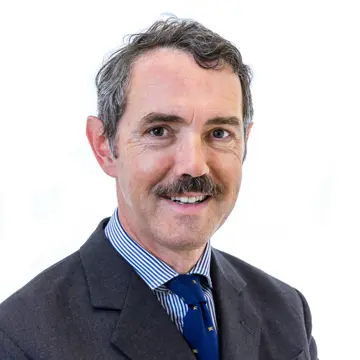
Professor Frank Larkin is one of the leading cornea experts at Moorfields Eye Hospital NHS Foundation Trust and Moorfields Private Hospital. He performs or supervises several corneal transplants each week, advises the government on the corneal transplant services across the UK and has led a randomised trial on the efficacy of corneal cross-linking in keratoconus in children.
What are your areas of expertise?
My special interest is corneal transplantation in both adults and children. I perform or supervise over 150 transplants annually, including penetrating transplants in which full thickness cornea is replaced, and lamellar transplants in which only the affected corneal layers are replaced.
I also undertake cataract/lens replacement surgery regularly, dealing in many cases with complex cataracts and intraocular lens complications or patients with a combination of cataract and corneal diseases.
In addition, I treat corneal infection and other inflammatory problems of the ocular surface, corneal abrasion, Fuchs dystrophy, keratoconus and various children’s eye conditions.
What is your most recent research project?
I was a chief investigator in the recently completed Keralink trial of efficacy of corneal cross-linking in keratoconus in 10-16 year olds. This was a 7-year long comprehensive randomised trial with the results of significance for national and international provision of cross-linking services.
I am writing national guidelines for optometrists on assessment and referral of keratoconus patients. It is expected that the guidelines will be endorsed by the Royal College of Opthalmologists and the Association of Optometrists and circulated to their members.
Why do patients come to see you?
Patients from across the UK and from abroad attend for corneal expertise, especially when it comes to difficult cases of very advanced keratoconus and failed previous corneal transplants. I regularly perform transplants and train junior surgeons in this surgery. And unlike many consultant colleagues, I treat both paediatric and adult patients - from early infancy to the very elderly.
I often advise patients - and those medical colleagues who refer – that unnecessary and unsuccessful surgery are the two things to avoid most; I am sure that the quality of decision-making on surgery improves with increasing consultant career experience.
-
More about Professor Frank Larkin
Learn more about Mr Larkin's qualifications, professional memberships and the conditions he treats.
-
Refer your patient to Moorfields Private
Choose world-leading eye care for your patients.